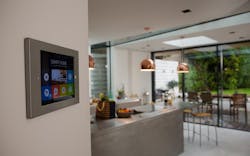Smart Home Tech Will Take a More 'User-Centric' Route in the Next Five Years
New technology innovations are hitting the residential sector seemingly every day, catching the attention of a growing consumer base looking to automate and simplify everyday tasks within their homes. But with so many advancements already making waves in the residential market, how much more progress can smart home technology make within the next five years? According to the Custom Electronics Design and Installation Association (CEDIA), one of the smart home technology industry’s leading trade groups, technology integrators are only getting started.
By 2027, CEDIA hopes to create hyper-personalized user experiences with home technology products built to improve the human condition, Forbes reports. By spending more time on consultation and holistic design, CEDIA’s smart home approach is centered on boosting homeowner presence, comfort, health, safety, and sustainability.
“Technologies to improve connectedness and safety enable people to live more independent, comfortable, and dignified lives,” the CEDIA paper notes. Technology makes remote caregiving and telemedicine appointments possible. “It is not just the users that benefit, as the peace-of-mind that this affords their extended families can be of immense value,” it notes. With a rapidly-aging population, this trend will likely increase and integrators can play an increasingly important role in keeping them safe at home.
